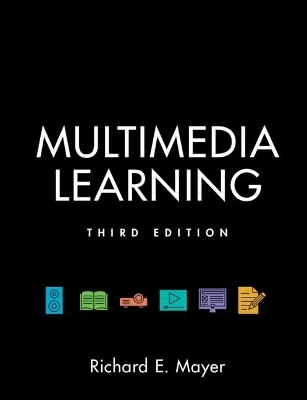
Multimedia Learning
Cambridge University Press (Verlag)
978-1-316-63808-8 (ISBN)
Advances in computer graphic technologies have inspired new efforts to understand the potential of multimedia instruction as a means of promoting human learning. In Multimedia Learning, Third Edition, Richard E. Mayer takes an evidence-based approach to improving education using well-designed multimedia instruction. He reviews 15 principles of multimedia instructional design that are based on more than 200 experimental research studies and grounded in a cognitive theory of how people learn from words and graphics. The result is the latest instalment of what Mayer calls the Cognitive Theory of Multimedia Learning, a theory introduced in previous editions of Multimedia Learning and in The Cambridge Handbook of Multimedia Learning, Second Edition. This edition provides an up-to-date and systematic summary of research studies on multimedia learning, supplemented with complementary evidence from around the globe. It is well-suited to graduate and undergraduate courses in psychology, education, computer science, communication, instructional design, and game design.
Richard E. Mayer is Distinguished Professor of Psychological and Brain Sciences at the University of California, Santa Barbara, USA. He served as President of the Division of Educational Psychology of the American Psychological Association and Vice President of the American Educational Research Association for the Division of Learning and Instruction.
Part I. Introduction to Multimedia Learning: 1. The promise of multimedia learning; 2. The science of learning: determining how multimedia works; 3. The science of instruction: determining what works in multimedia learning; 4. The science assessment: determining what is learned; 5. Multimedia principle; Part II. Principles for Reducing Extraneous Processing in Multimedia Learning: 6. Coherence principle; 7. Signaling principle; 8. Redundancy principle; 9. Spatial contiguity principle; 10. Temporal contiguity principle; Part III. Principles for Managing Essential Processing in Multimedia Learning: 11. Segmenting principle; 12. Pre-training principle; 13. Modality principle; Part IV. Principles for Fostering Generative Processing in Multimedia Learning: 14. Personalization principle; 15. Voice principle; 16. Image principle; 17. Embodiment principle; 18. Immersion principle; 19. Generative activity principle; Part V. Conclusion: 20. Principles of multimedia design.
| Erscheinungsdatum | 10.07.2020 |
|---|---|
| Zusatzinfo | Worked examples or Exercises |
| Verlagsort | Cambridge |
| Sprache | englisch |
| Maße | 189 x 245 mm |
| Gewicht | 990 g |
| Themenwelt | Schulbuch / Wörterbuch ► Unterrichtsvorbereitung ► Unterrichts-Handreichungen |
| Geisteswissenschaften ► Psychologie ► Allgemeine Psychologie | |
| Geisteswissenschaften ► Psychologie ► Pädagogische Psychologie | |
| Geisteswissenschaften ► Psychologie ► Verhaltenstherapie | |
| Sozialwissenschaften ► Pädagogik | |
| ISBN-10 | 1-316-63808-1 / 1316638081 |
| ISBN-13 | 978-1-316-63808-8 / 9781316638088 |
| Zustand | Neuware |
| Informationen gemäß Produktsicherheitsverordnung (GPSR) | |
| Haben Sie eine Frage zum Produkt? |
aus dem Bereich


